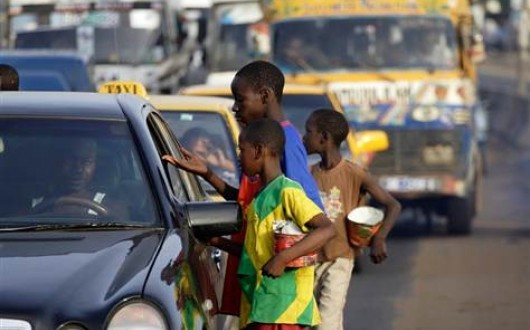COVID-19 And Streetism; How Safe Are Our Children
- Home
- COVID-19 And Streetism; How Safe Are Our Children
COVID-19 And Streetism; How Safe Are Our Children
 The streets are back to life. It is as if COVID-19 is gone forever.
The streets are back to life. It is as if COVID-19 is gone forever.Vehicular traffic is at its peak in the national capital with the popular 37 Military Hospital road to Accra Mall busy with street activities.
The traffic is in red and car engines are producing varied sounds but, suddenly, the shrill voice of Sumaya caught my attention; she was begging a passenger to allow her carry her load to the next lorry station for some money.
Sumaya looks unkempt – a perfect definition of ‘the body is weak but the soul is willing.’
The 12-year-old class four pupil had migrated from a town in the Northern Region to seek for a “better life” in Accra.
She told the writer that she fled the area with her elder sister due to the closure of schools in March as a result of the Covid-19 pandemic for greener pastures in the capital city.
She said she earns very little as a head porter (kayayo), stressing that people who engaged her services paid as low as one cedi for the size of a 50 kilogram luggage.
“I’ve lost my dad and my mom is unemployed. Life is hard for us in Walewale but, surprisingly, it’s harder here in Accra,” Sumaya said.
She said she earned too little to save any and not sure she could go back to school to realise her dream of becoming a nurse.
The lanky girl said she lived with other kayayei, young and old, in wooden structures at the Mallam Atta Market but came to work in the streets and Nima Market on Wednesdays, being the market days.
Her friend, Rama, eight-year-old, also a pupil from Walewale, said her mother left her little brother with her grandmother so they could go and ‘look for money’ for the family before school resumed.
She said the kayayei business was quite ok and that she and her mother were able to raise enough money to “pay five cedis daily for a room to sleep in at Makola but we share with other kayayei who cannot afford to pay this amount.”
Sumaya and Rama are, however, not the only entrants into the Kayayei business. A host of girls and boys, mainly from the northern parts of the country, have poured onto the streets of Accra for one economic activity or the other.
Boys are spotted in traffic selling different items or cleaning vehicle windscreens for money with risks of knock downs and bad weather conditions.
This writer was told of frequent sexual abuse of the girls with a few becoming pregnant within three to six months in the streets.
This is purely a development issue, which must be taken seriously by all, especially the authorities.
I’m surprised it is not featuring in the manifestoes of the political parties but I think it is time the Department of Social Welfare and the Department of Children, under the Ministry of Gender, Children and Social Protection, got empowered to take the children off the streets.
Civil society organisations with focus on child welfare must rise to the occasion, get to the streets and get the job done.
The 1992 Constitution of Ghana makes provision for the protection of children and it is the responsibility of us all to do that for rapid sustainable development because children are the Country’s future leaders.
Their presence in the streets is an eyesore. Children’s life matter.
By Mary Abena Otoo
Source: GNA
- Share
Classic Ghana
Classic Ghana brings you into a fun world of arts, entertainment, fashion, beauty, photography, culture and all things in between. Let’s explore these together!







